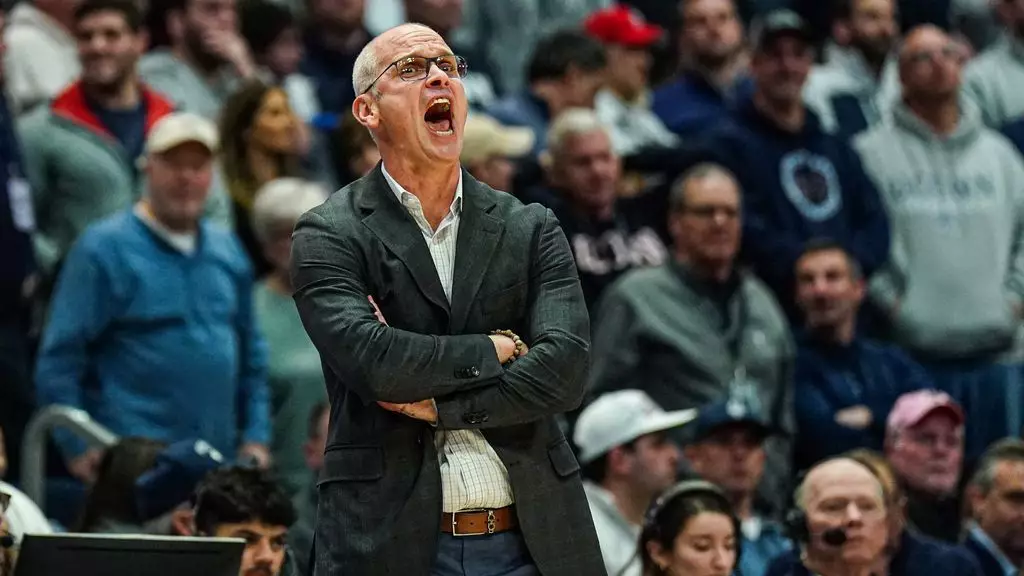In the high-stakes world of college basketball, emotions run rampant. Dan Hurley, the fiery UConn coach, stands as a fascinating case study in the delicate balance between passion and professionalism. After a heart-wrenching loss to the top-seeded Florida Gators in the NCAA tournament, Hurley’s emotional response transcended mere disappointment. Caught on camera, he launched into a profanity-laced critique about the officiating, suggesting that the referees had done a disservice to his team—a common sentiment among coaches but one poorly articulated in the heat of the moment.
Hurley’s subsequent acknowledgment of regret reflects a reality many coaches face: the need to oscillate between being the team’s fierce advocate and maintaining an air of decorum. By admitting that there are things he wishes he hadn’t done, he not only shows introspection but also reinforces the notion that emotions can cloud judgment, leading to regrettable statements that might overshadow an impressive three-year run.
Media Interaction: A Double-Edged Sword
The coach’s comments sparked a variety of reactions, particularly concerning a media member’s decision to record the incident. Joey Ellis of Queen City News captured Hurley’s heated exchange, an act that elicited a response from UConn’s director of men’s basketball communications. The ensuing drama raised questions about the ethics of capturing raw emotions in a professional setting. While coaches have the right to vent frustrations, the media’s role in broadcasting those moments raises ethical dilemmas about respect for privacy.
Bobby Mullen’s attempt to quash the video exemplifies the instinct to protect one’s program at all costs, even if it means employing questionable tactics. Hurley’s subsequent apology demonstrates a different understanding of accountability, acknowledging that the situation spiraled out of control due to his actions. The question remains, however: Should the media have a free pass to document every moment, especially when emotions run high? It’s a gray area that merits further examination.
The Pressure Cooker of College Basketball
Hurley’s emotional flare-ups are symptomatic of the intense pressure that permeates college athletics. The quest for territory in a competitive landscape breeds anxiety and reactive outbursts, often from people who care deeply about their teams. The psychological toll on coaches like Hurley can be immense. He mentions the excruciating end to a remarkable journey and how that impacted his judgment. In some senses, it’s admirable to witness a coach who wears his heart on his sleeve; yet, such displays challenge the professionalism expected in collegiate sports.
Throughout this season, Hurley exhibited a pattern of heated interactions, from contentious referee discussions to mocking opposing fans. Could these be seen as passion-infused zeal or belligerent confrontations? This debate exposes a divide in coaching philosophy that often gets minimized in public discourse. Passionate coaching can inspire athletes, but it can also serve as an unstable foundation for a program—one that Takes pride in discipline and sportsmanship.
The Culture of Accountability and Learning
Reflecting on his behavior, Hurley acknowledges the need to learn from his mistakes. He reveals a commitment to “take measures both internally, mentally, and externally” to better manage his emotions. This candid recognition of growth is commendable, resonating well within a culture that often overlooks the importance of accountability.
He does, however, walk a tightrope between asserting his coaching identity and integrating a more composed demeanor. It’s imperative for coaches to embrace moments of vulnerability while also striving to cultivate a positive environment for their athletes. Hurley’s admission that “it’s part of what you get with me” articulates a loyalty to his coaching style, yet it also invites scrutiny regarding whether a more tempered approach could yield equally effective results.
In a society that often celebrates intensity and fervor, Dan Hurley’s journey presents a compelling portrait of a coach in turmoil. His mistakes ring true in the realm of sports, where the balance between authenticity and professionalism often tips precariously. As the UConn program looks to the future, Hurley’s reflections on his emotional outbursts stand as both a cautionary tale and a source of inspiration. The evolving landscape of college basketball could certainly benefit from more discussions surrounding the human conditions that shape both victories and defeats.



Leave a Reply